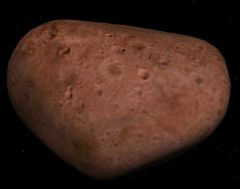Difference between revisions of "1583 Antilochus"
Jump to navigation
Jump to search
(Created page.) Tag: Removed redirect |
m (Arvil moved page User:Arvil/Sandbox02 to 1583 Antilochus: Move to article page.) |
(No difference)
| |
Latest revision as of 11:22, 28 October 2024
| 1583 Antilochus | |
|---|---|

| |
| 1583 Antilochus from Trojans.zip in Orbiter 2006P1 | |
| Designation | |
| Name | 1583 Antilochus |
| Reference body | Sun |
| Planetary mean orbits | |
| Epoch | 2009.46064339 |
| Semimajor axis (a) | 778417560353.55 m |
| Eccentricity (e) | 0.0533523 |
| Inclination (i) | 28.5458599992352° (0.4982192448 radian) |
| Longitude of the ascending node (LAN, ☊) | 221.379150001925° (3.8637950628 radian) |
| Longitude of periapsis (ϖ) | 47.3182500010424° (0.8258592588 radian) |
| Mean longitude (L) | 33.1781400007087° (0.5790677827 radian) |
| Selected physical parameters | |
| Mean radius | 50500 m |
| Mass | 3.2×1017 kg |
| Rotation elements | |
| SidRotPeriod | 88056 seconds (24.46 hours) |
| SidRotOffset | 0 |
| Obliqutiy | 0 |
| LAN | 0 |
| Note | *Elements given are from 1583 Antilochus.cfg (Trojans.zip) |
1583 Antilochus (1926 VF, 1950 SA, 1974 WH1) is a large Jupiter Trojan asteroid of the Greek camp (whose orbits lie in the L4 point 60° ahead of Jupiter. It was discovered by Sylvain Arend at the Royal Observatory of Belgium in September 1950, but was first observed in Noveber 1926, and was named after Antilochus from Geek mythology.
1583 Antilochus in Orbiter[edit]
1583 Antilochus was introduced to orbiter with the release of Trojans.zip add-on in June 2009.
| Add-on | Source | Version | Author | Type | Release Date | Compatibility | Wiki article |
|---|---|---|---|---|---|---|---|
| Trojan Asteroids v1.01 | O-F Resources | v1.01 | sputnik | Scenery | 27 June 2009 | ||
See also[edit]
Gallery[edit]
| edit The Solar System | |
|---|---|
| Central star |
Sun (Sol) |
| Planets |
Mercury - Venus - Earth - Mars - Jupiter - Saturn - Uranus - Neptune |
| Natural satellites |
Moon - Phobos - Deimos - Io - Europa - Ganymede - Titan - more... |
| Add-ons |
Planets - Dwarf Planets - Small objects - Natural satellites - Alternative star systems |
